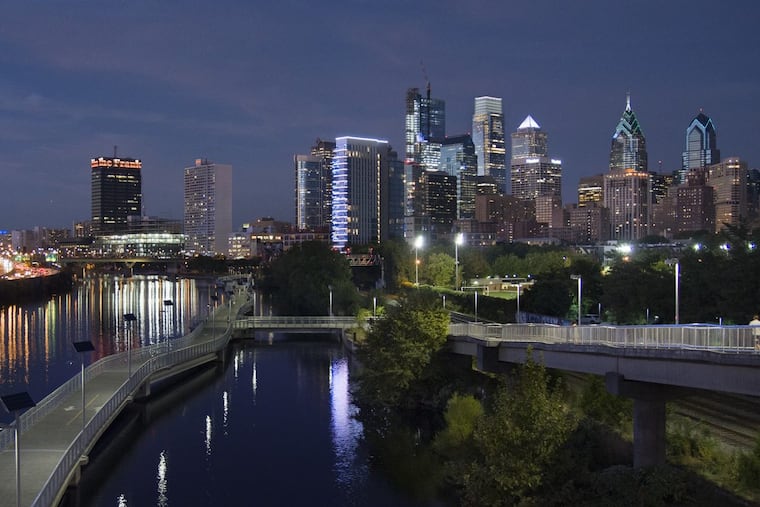Philly's regional economy: A look back at 2017, and ahead at next year | Joel Naroff
This year has been a good one, but not necessarily great, for the Philadelphia economy. Yet we are creating jobs, and are considered a great place for millennials to live.

The year is coming to an end, and that means it's time to look back to see how we have done, while also prognosticating on how fast the region's economy might expand in 2018.
This has been a good but not necessarily great year for the Philadelphia regional economy.
Employment growth here exceeded the nation's, something rarely seen over the last 25 years. Though the city lagged a bit, the ring around Philadelphia — Bucks, Montgomery, and Chester Counties (MBC), the Camden metro area, and Wilmington — matched or surpassed national gains. (In the government data, Delaware County is grouped with the city rather than the other suburban counties.)
We are creating jobs solidly in the region, which is the best news possible.
Despite decent payroll increases, unemployment here remained elevated. We are not talking major concerns, as the region's rate was only modestly above the nation's. The metro area as a whole was in the mid-4 percent range while the nation was closer to 4 percent. What kept the rate down was a large decline in the MBC rate, to 3.7 percent.
Not surprisingly, the biggest issues remain in Philadelphia and Camden, where the less skilled workforces continue to find it difficult to secure employment. The very solid 1 percentage point decline in unemployment in Philadelphia was good to see. Unfortunately, the rate remains around 6 percent. In Camden County, little progress was made as the rate remained around 5.5 percent.
Labor market numbers don't tell the full story, however.
The region's housing market is doing well, and prices, especially in the city of Philadelphia, have increased solidly. By contrast, the suburbs, especially South Jersey, saw home prices rise only modestly. Indeed, the Camden metro area posted the slowest price increase of the top 100 U.S. metro areas. And while housing starts have improved, they are moderating, which is not a good trend.
There are other, non-data reasons to be optimistic about the region's prospects. For example, Trulia named Philadelphia the best place for millennials to live. Given the growing importance of this generation, that's saying a lot. The region has moved to the top of the lists of places to visit and dine, which is critical for the key hospitality sector.
Put simply, the economy moved forward in 2017, but we could have done better.
In 2018, that could change. Philadelphia could become one of the prime locations for the future economy.
When you consider what will determine the winners and losers in the battle for future economic supremacy, Philadelphia has it all. Most important, the outlook for the crucial technology sector is incredibly bright.
The soon-to-be-finished research building being built by Comcast is likely to be the catalyst. As Comcast notes: "The 60-story tower will … become a dedicated home for the company's growing workforce of technologists, engineers, and software architects. The facility will also create a media center in the heart of the city … and offer space for local technology start-ups."
This vertical campus has the potential to become a magnet for technology talent and companies from around the world. If technology is the major building block of future economies, the Comcast Technology Center should put the city and region in position to grow strongly for decades.
Though it may take time to build out the sector, it should happen. As Trulia pointed out, this region is the best area for millennials to live — and we have an awful lot of them. Our problem has been that we couldn't keep them.
Philadelphia's "eds" sector produces about 90,000 university degrees each year, providing a large supply of skilled workers for technology firms. Affordable housing makes it relatively easy for younger workers to live here. For millennials, though, it's ultimately about job opportunities. As the Comcast technology nexus expands, those openings will accelerate.
But the future is not just in technology. The aging population will require mounting health-care services. Our massive "meds" sector is positioned to expand further to meet those growing needs, even if the battle over the Affordable Care Act limits access and demand.
And there is also the continuing move toward internet sales and distribution. Our centrally located region, with its ports, airport, rail lines, and highway system, makes us well-positioned to host the warehouses and data centers this segment of the economy requires.
I expect the region's economic transition to greatly accelerate next year. Assuming no recession at the national level, the changes in the Philadelphia region's economic structure could set us up to outperform the nation for years to come.
jnaroff@phillynews.com